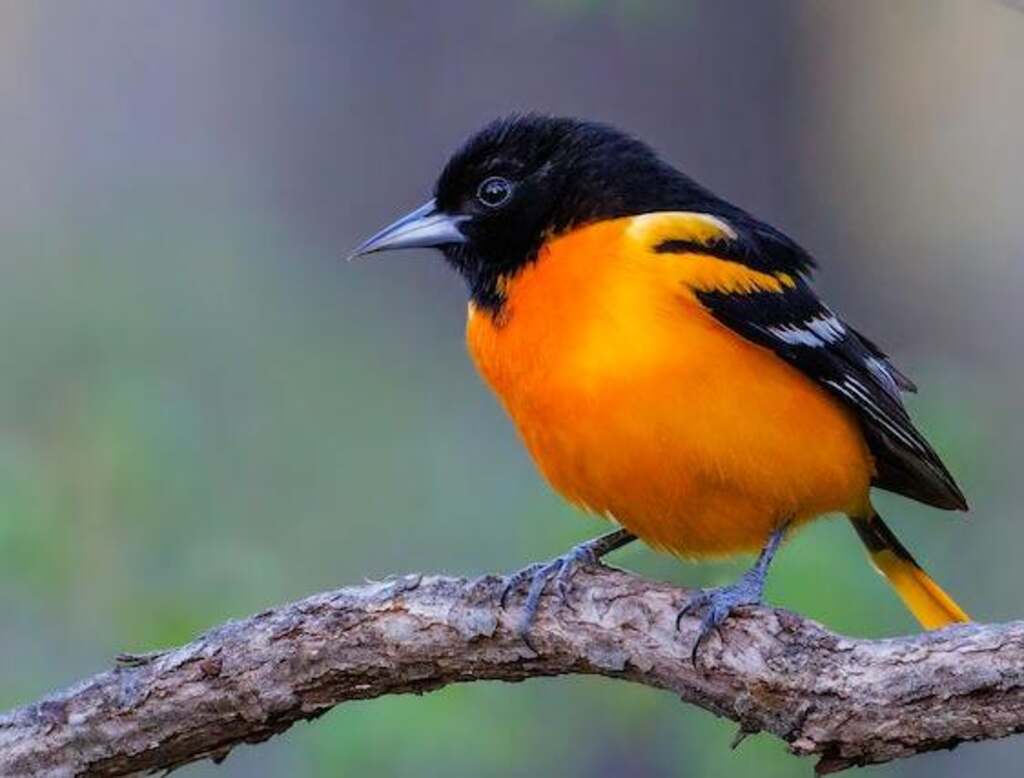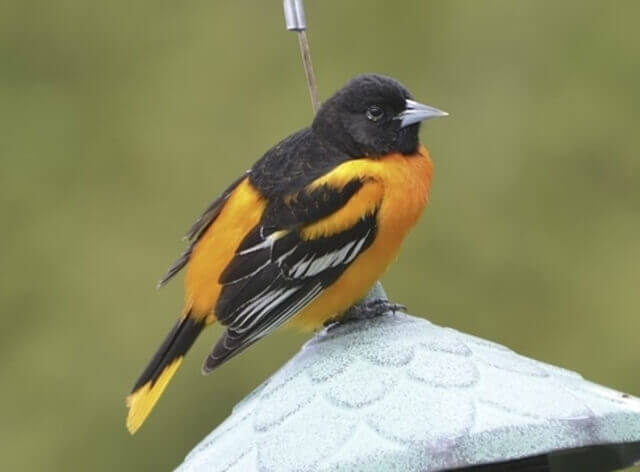Baltimore Orioles are a common sight in many backyards across North America, with their bright orange plumage and distinctive songs.
As with many bird species, their diet and feeding habits have been the subject of much debate and speculation among ornithologists and bird enthusiasts.
One particular question that has arisen is “Do Baltimore Orioles eat eggs?”
In this article, we will explore the evidence and arguments surrounding this question, drawing on scientific studies and observations from bird experts.
By examining the ecological role of Baltimore Orioles, their feeding habits, and possible reasons for egg consumption, we can gain a deeper understanding of this fascinating bird species and the impact they have on their environment.
Additionally, we will consider the potential consequences of egg consumption on other bird species and explore alternative food sources for Orioles.
Table of Contents
- 1 Do Baltimore Orioles Eat Eggs?
- 2 Baltimore Orioles’ Diet and Feeding Habits
- 3 The Debate on Orioles Eating Eggs
- 4 Evidence Supporting Orioles as Egg Eaters
- 5 Reasons Why Orioles May Eat Eggs
- 6 Impact on Other Bird Species
- 7 Alternatives to Egg Consumption for Orioles
- 8 Conservation Efforts to Protect Orioles and Other Birds
- 9 Conclusion: Understanding Baltimore Orioles’ Ecological Role
- 10 Frequently Asked Questions
- 11 Conclusion
- 12 Author
Do Baltimore Orioles Eat Eggs?
Baltimore Orioles are primarily insectivorous, but they are known to consume other food sources, including fruit, nectar, and occasionally eggs.
These birds are attracted to jelly and other sweet foods, so it is not uncommon to see them feeding on these offerings in backyards.
While Baltimore Orioles do not typically feed on other bird species’ eggs, there have been reports and studies showing that they do consume eggs of other species, including Wood Thrushes.
It is important to note, however, that while Baltimore Orioles do eat eggs, this behavior is not their primary feeding strategy.
Their diet consists mainly of insects, and studies have shown that the consumption of eggs is a rare occurrence.
Baltimore Orioles’ Diet and Feeding Habits
The diet and feeding habits of Baltimore Orioles have been extensively studied and documented by ornithologists.
These birds have a diverse diet, consuming insects, spiders, fruit, nectar, and even small amphibians.
Orioles are known for their unique feeding patterns, where they use their sharp beaks to pierce fruit and flowers to extract their sweet juices.
Orioles also have migratory behavior, where they fly south for the winter and return to breed in the summer.
During breeding season, male orioles are known to feed their mates as part of their courtship ritual.
While there is no evidence that Baltimore Orioles commonly consume eggs, there is a debate among bird enthusiasts about whether or not they occasionally do so.
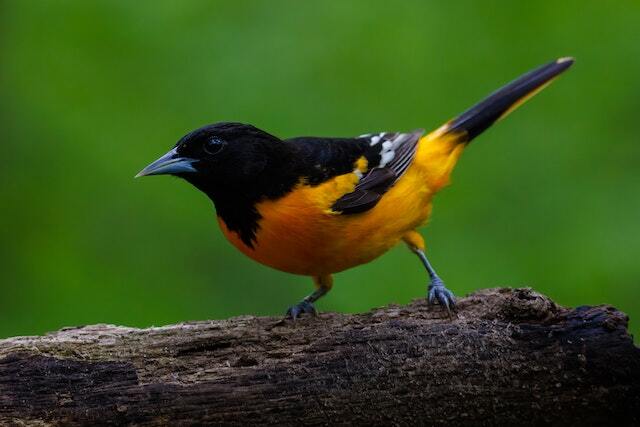
The Debate on Orioles Eating Eggs
The consumption habits of certain avian species continue to be a topic of debate among researchers and ornithologists alike, with varying opinions and evidence regarding the inclusion of certain food items in their diets.
Baltimore Orioles, known for their bright orange plumage and distinct chirping calls, have long been studied for their behavior and ecological niche in the food chain.
While their primary diet consists of fruit, nectar, and insects, there is some evidence suggesting that they may also consume eggs.
However, this topic is still controversial, with some experts arguing that the evidence is inconclusive and that Orioles do not have the necessary adaptations to break through eggshells.
Nevertheless, the debate on Orioles eating eggs continues to intrigue ornithologists and bird enthusiasts alike. In the subsequent section, we will explore the evidence supporting Orioles as egg eaters.
Evidence Supporting Orioles as Egg Eaters
Evidence has been found to suggest that certain avian species consume a variety of food items, including those that are not typically associated with their dietary habits. Orioles, in particular, have been observed eating insects, fruit, and nectar.
However, there have also been reports of orioles feeding on eggs, both of their own species and those of others.
In fact, a study conducted in 2017 found that Baltimore Orioles were responsible for eating the eggs of other bird species, specifically those of the Wood Thrush.
While there is still much debate surrounding the dietary preferences and feeding behavior of orioles, it is clear that they have the ability to consume a wide range of food items, including eggs.
This raises questions about the reasons why orioles may eat eggs, which will be explored in the subsequent section.
Reasons Why Orioles May Eat Eggs
Understanding the potential ecological and evolutionary drivers of egg consumption by orioles requires considering factors such as nutrient availability, predation risk, competition, and parental investment.
Orioles may eat eggs as a result of predator-prey dynamics, where they may take advantage of a nest that has been abandoned or compromised by the predator.
Additionally, orioles have high nutrient requirements during the breeding season, and consuming eggs may provide a source of valuable nutrients.
Finally, breeding behavior may influence egg consumption, as some bird species remove eggs from their own nests to reduce competition for resources.
While these factors suggest that orioles may eat eggs, it is important to note that not all orioles consume eggs, and there may be other factors at play.
Understanding the potential impact of egg consumption on other bird species is an important next step in determining the ecology of these interactions.
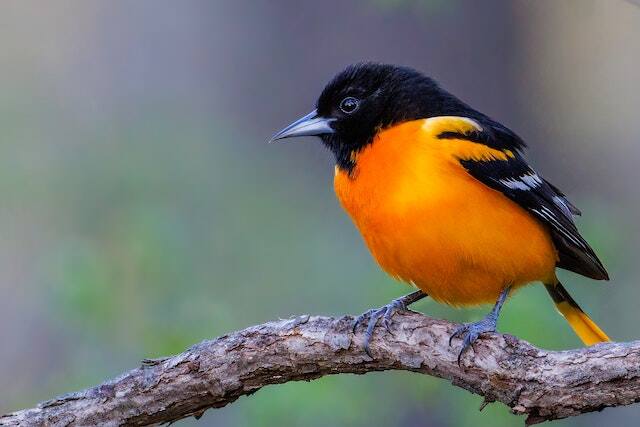
Impact on Other Bird Species
Examining the ripple effects of egg consumption by avian species holds the key to unlocking the intricate web of ecological relationships that govern bird communities.
When considering the impact of Baltimore Orioles consuming eggs, it is important to assess how this behavior affects other bird species.
Egg consumption by orioles can disrupt ecological balance and food chain dynamics, potentially leading to a decrease in the population of other bird species.
This is because eggs serve as a critical source of nutrition for many bird species, and the loss of this resource can have cascading effects throughout the food chain.
Thus, it is crucial to explore alternatives to egg consumption for orioles to mitigate the potential impact on other bird species.
Alternatives to Egg Consumption for Orioles
Identifying alternative food sources for avian species such as the Baltimore Oriole can help mitigate the potential impact of egg consumption on other bird species and maintain ecological balance.
Bird friendly diets that include insect protein and fruit alternatives can provide the necessary nutrients for orioles without negatively affecting other bird populations.
Insect protein can be found in mealworms, crickets, and other insects, which can be purchased or raised at home.
Fruit alternatives such as grape jelly and oranges can also provide a sweet and nutritious snack for orioles.
By promoting alternative food sources, we can ensure the survival of Baltimore Orioles while also preserving the delicate balance of our ecosystem.
Conservation efforts to protect orioles and other birds are crucial in maintaining a healthy and thriving environment.
Conservation Efforts to Protect Orioles and Other Birds
Conservation efforts aimed at protecting avian species such as the Baltimore Oriole and other birds are crucial in maintaining a healthy and thriving ecosystem, ensuring the survival of these magnificent creatures for generations to come.
Habitat restoration is one such effort that involves restoring natural habitats and planting native vegetation to provide food and shelter for birds.
Predator control, such as the removal of invasive species and the control of feral cats, is another important measure to protect birds from predation.
Public education is also a critical component of conservation efforts, as it raises awareness about the importance of birds and their role in the ecosystem, as well as the threats they face.
Through these efforts, we can work towards a future where birds like the Baltimore Oriole can thrive in their natural habitats, fulfilling their ecological roles as pollinators and insect controllers.
This understanding of their role in the ecosystem is crucial to creating a sustainable and healthy environment for all species to coexist.
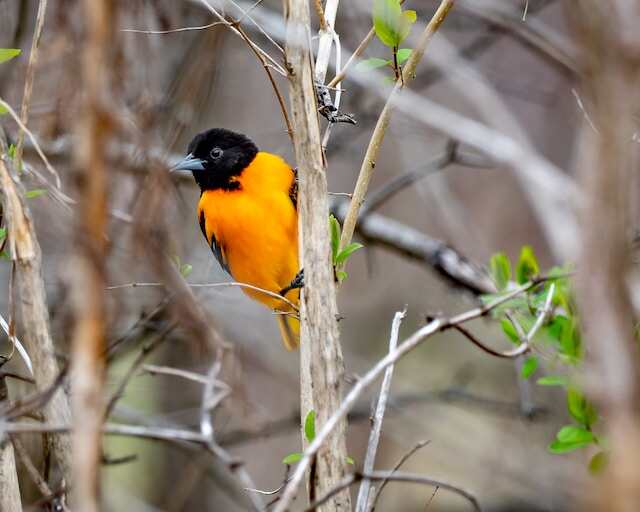
Conclusion: Understanding Baltimore Orioles’ Ecological Role
As we gain a deeper understanding of the ecological role of the Baltimore Oriole, we can appreciate the intricate web of interdependence that exists within our ecosystem, with each species playing its unique part in maintaining the delicate balance of nature.
The Baltimore Oriole is not only a beautiful bird to observe, but it also serves a vital ecological significance in our environment.
As a seed disperser, insect predator, and pollinator, the Baltimore Oriole contributes to the health and diversity of our ecosystem.
Habitat preservation and community education are essential in protecting the Baltimore Oriole and other species that share its habitat.
By protecting their natural habitat, we can ensure their continued ecological role in our environment.
Educating the community about the significance of the Baltimore Oriole and other birds can inspire people to take action towards conservation efforts.
The following table shows the food preferences and habitat of the Baltimore Oriole, highlighting its ecological role.
| Baltimore Oriole | Food Preferences | Habitat |
|---|---|---|
| Seed Disperser | Berries, fruits, and insects | Open woodlands, forest edges, and parks |
| Insect Predator | Caterpillars, ants, and spiders | Riparian areas and deciduous forests |
| Pollinator | Nectar and pollen | Flowering trees, shrubs, and plants |
Overall, understanding the Baltimore Oriole’s ecological role is critical in protecting our environment and maintaining a healthy ecosystem.
By preserving their natural habitat and educating the community about their significance, we can ensure their continued presence and ecological contribution.
Frequently Asked Questions
What is the average lifespan of a Baltimore Oriole?
The Baltimore Oriole, a migratory songbird species found in North America, has an average lifespan of approximately 5-7 years. However, their lifespan is significantly impacted by various factors, including predation and habitat requirements.
These birds face numerous predators, such as snakes, squirrels, and cats, which can significantly reduce their lifespan.
Additionally, Baltimore Orioles have specific dietary requirements and prefer to feed on insects, fruit, and nectar.
They are not known to eat eggs, as they do not possess the necessary adaptations to break through the hard eggshell.
Oriole habitat requirements include trees for shelter and nesting, as well as open areas for foraging.
As their habitat continues to be threatened by deforestation and urbanization, it is essential to ensure the conservation and preservation of their natural habitats.
By understanding the factors that influence the lifespan of Baltimore Orioles, including their predators, diet, and habitat requirements, we can take steps towards protecting and preserving this important migratory species.
How do Baltimore Orioles communicate with each other?
Baltimore orioles are known for their distinctive vocalizations, including a variety of songs and calls. Recent research suggests that these birds also use visual signals, such as tail flicking, to communicate with one another.
Additionally, honeydew communication, which involves the exchange of information through the use of plant sap, may play a role in their communication.
While much is still unknown about the specifics of how Baltimore Orioles communicate, it is clear that they have developed a complex system of signals that allow them to understand one another and navigate their environment.
Understanding the intricacies of these signals could provide insights into the evolution of communication more broadly and ultimately contribute to the development of new technologies or approaches for communication in human society.
What is the nesting behavior of Baltimore Orioles?
Baltimore Orioles are known for their distinctive nests, which are woven together using plant fibers, hair, and other natural materials. These nests are typically suspended from the tips of branches, often high up in deciduous trees.
The female Baltimore Oriole is responsible for building the nest, which can take over a week to complete.
Once the nest is finished, the female will lay between 3–7 eggs, which she will incubate for approximately two weeks. During this time, the male will bring food to the female, who rarely leaves the nest.
Once the eggs hatch, both parents will work tirelessly to feed their chicks a diet of insects and fruit. The chicks grow quickly, and within two weeks, they will fledge and leave the nest.
While the Baltimore Oriole’s nesting behavior is fascinating, it is important to note that they do not eat eggs, and their diet is primarily made up of nectar, fruit, and insects.
How do Baltimore Orioles contribute to their ecosystem?
The Baltimore Orioles are crucial contributors to their ecosystem. They play a vital role in maintaining the balance of nature through their food sources, predator avoidance, and habitat maintenance.
These birds feed on a variety of insects, including caterpillars, beetles, and spiders, which helps to control the insect population in their habitat.
Additionally, Baltimore Orioles are known for their unique nest-building skills, which provide shelter for other species in their ecosystem.
They also contribute to the overall health of their habitat by aiding in the pollination of flowers.
Furthermore, Baltimore Orioles have developed a range of predator avoidance techniques, including building their nests high in trees and being highly vocal when they sense danger.
Overall, the Baltimore Orioles have an essential role in their ecosystem, contributing to the health and balance of the environment in which they reside.
What is the migration pattern of Baltimore Orioles?
Bird watching enthusiasts eagerly await the arrival of the Baltimore Oriole during their spring migration, which typically begins in late April and extends through May. These birds are known for their vibrant orange plumage and melodious songs.
Habitat preservation efforts have become increasingly important in ensuring the survival of this species, as their preferred nesting areas, such as deciduous forests and orchards, have been threatened by deforestation and urbanization.
By protecting these habitats, we can continue to appreciate the beauty and wonder of the Baltimore Oriole, while also supporting the biodiversity of our ecosystem.
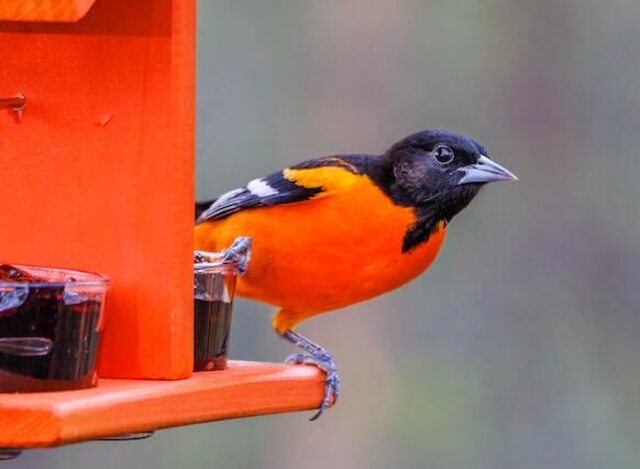
Conclusion
In conclusion, Baltimore Orioles are known for their diet of insects, fruits, and nectar. However, there is a debate on whether they also consume eggs. While some evidence suggests that they do eat eggs, there is no conclusive proof to support this claim.
Regardless, it is important to understand the reasons why they may consume eggs, such as a source of calcium during breeding season.
The impact of egg consumption on other bird species is also a concern, as Orioles have been known to raid other nests.
To mitigate this, providing alternative food sources, such as mealworms and suet, can help reduce the pressure on other bird populations.
Overall, understanding the ecological role of Baltimore Orioles and their feeding habits is crucial for conservation efforts to protect not only Orioles but also other bird species.

